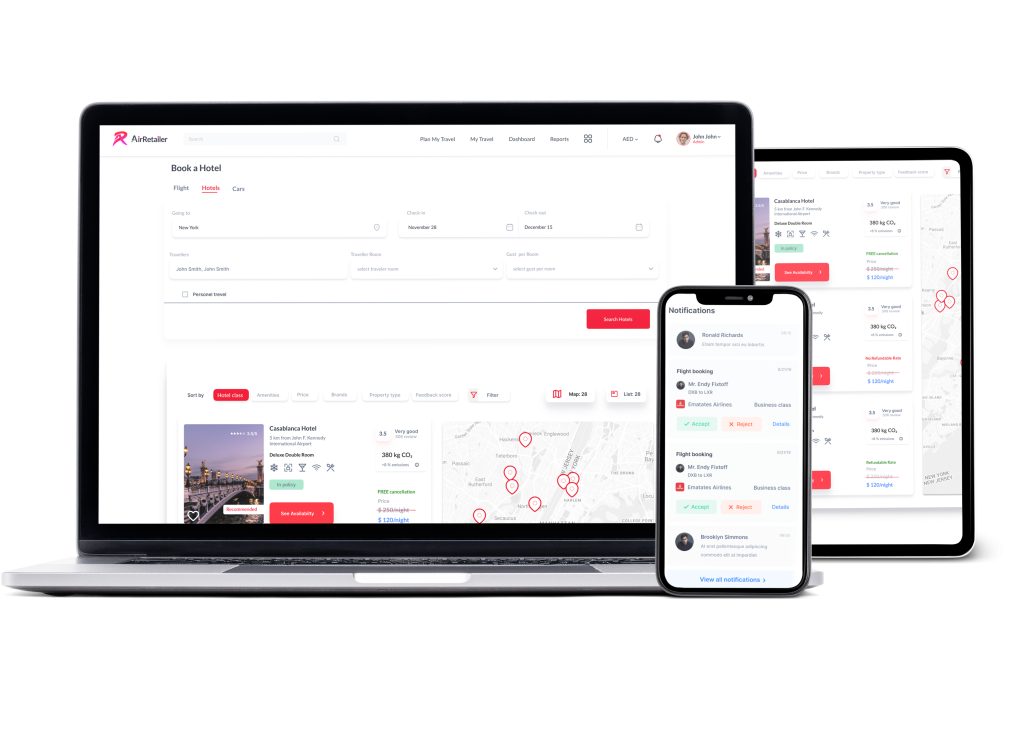In the modern corporate landscape, efficient travel management is a crucial component for business success. AirRetailer stands out as the ultimate end-to-end business travel solution, empowering companies to scale their travel operations without incurring additional costs and providing superior travel control. Our comprehensive Travel and Spend solution has the potential to revolutionize your corporate travel management. With AirRetailer’s single-screen interface, you can access an extensive global inventory, including NDC, LCC, and GDS fares, designed to cater to Travel Management Companies (TMCs) and corporate travelers alike.

Simplify Your Global Travel Booking Process
AirRetailer simplifies the global travel booking process by offering easy comparison shopping, personalized 24/7 service, and real-time global analytics. Here’s how:
- All-Inclusive Global Inventory: Access a wide range of travel options from New Distribution Capability (NDC) content, Low-Cost Carriers (LCC), and Global Distribution Systems (GDS) fares on a single platform.
- Easy Comparison Shopping: Quickly compare different travel options to find the best deals that meet your business needs.
- Personalized Service: Our dedicated support team is available around the clock to provide personalized assistance and ensure a seamless travel experience.
- Real-Time Analytics: Gain insights into your travel spend with our real-time analytics, enabling better decision-making and budget control.
Sustainable Travel, Powered by Tech
AirRetailer is committed to promoting sustainable travel. Our platform allows you to track and reduce your carbon footprint on business trips, contributing to a greener world, one expense at a time. Learn how AirRetailer can help you travel sustainably:
- Carbon Footprint Tracking: Monitor and manage the environmental impact of your business travel.
- Eco-Friendly Travel Options: Choose from a variety of sustainable travel options integrated into our platform.
- Corporate Social Responsibility: Enhance your company’s commitment to sustainability by making environmentally conscious travel decisions.
Empowering Travel Agents and TMCs
With NDC-rich travel content conveniently accessible on a single screen, AirRetailer empowers travel agents to offer a diverse range of travel options while focusing on personalized interactions and building stronger client relationships. Here’s what AirRetailer offers:
- Diverse Travel Options: Provide clients with a wide range of travel choices, enhancing their travel experience.
- Enhanced Client Relationships: Focus on personalized service and interactions, fostering stronger client relationships.
- Cutting-Edge Global Inventory: Deliver unparalleled value with our comprehensive inventory, designed to meet the needs of both TMCs and corporate bookings.
Effortless Expense Management
Managing travel expenses can be a daunting task. AirRetailer’s easy expense management solution streamlines the recording, tracking, and approval of expenses incurred during business travel. Key features include:
- Custom Policy Builder: Create and enforce custom travel policies tailored to your company’s needs.
- Automated Approvals: Simplify the approval process with automated workflows, reducing administrative burden.
- Expense Tracking: Keep accurate records of all travel expenses, ensuring transparency and accountability.
Discover how AirRetailer can transform your corporate travel management. Contact us today to learn more about our innovative solutions and how we can help you scale your business travel efficiently and sustainably. Embrace a new era in tailored travel experiences with AirRetailer, where technology and sustainability meet to provide unmatched value and control.

